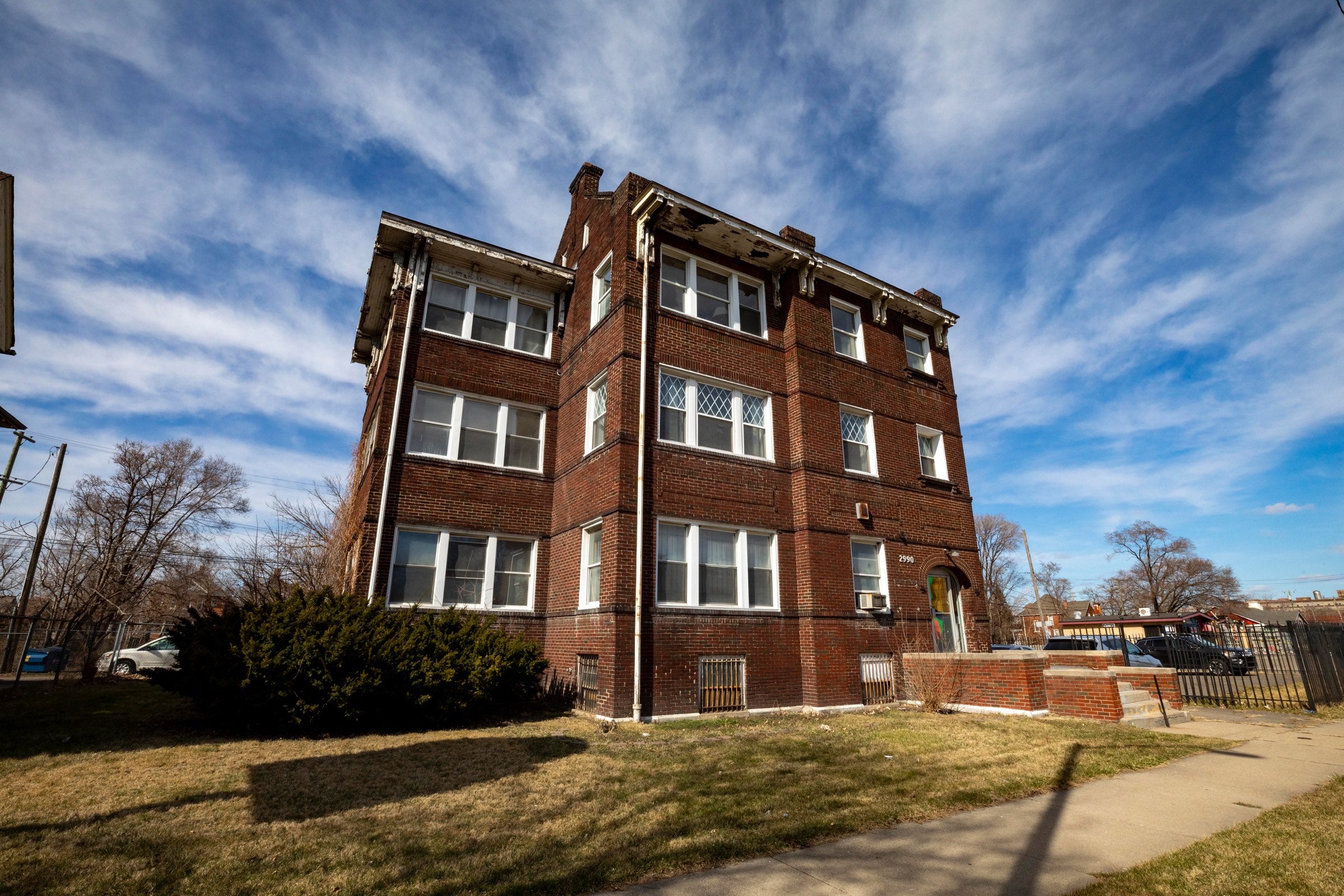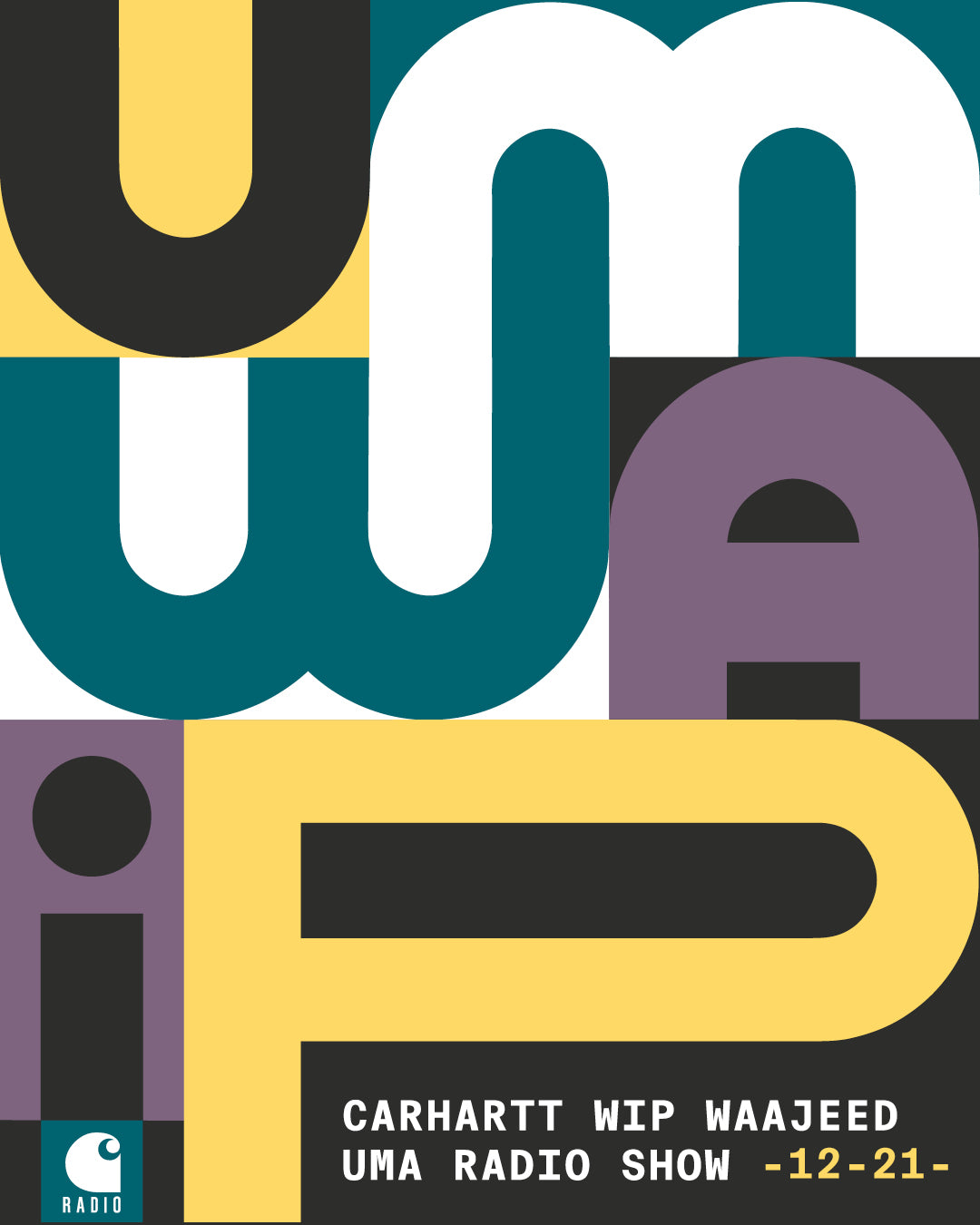Artist Feature: Waajeed - Underground Music Academy
Click here to listen to the Carhartt WIP Radio Show featuring Waajeed.
The sounds and textures of contemporary American music have always been defined by their geographies, whether through hyper-regionality and its subsequent seep into the mainstream, or seismic battles between coasts. But there are few places you are more acutely aware of this than Detroit, where a single stretch of road has seen the genesis of new modes of music and styles over the past 60 years, continually reshaping the sound of the city, and America, in the process.
Travel along East Grand Boulevard, you will pass what is now the Motown museum; an idyllic looking home with a white picket fence that was home to Motown records in its formative years, and where the likes of Stevie Wonder and The Supremes would record. Go further east and you will reach Submerge Records, where the pioneering techno collective Underground Resistance are based. Their influence is displayed in a makeshift museum that not only catalogues the group’s history but also the futuristic points of inspiration which they would draw from. A stone’s throw across the street, with billowing purple curtains in tribute to Prince, you’ll find the recording studio of Moodymann, whose sticky house sounds belie the fact that they are, in the words of this month’s Carhartt WIP Radio show host, “records of protest… ‘I am here. I matter,’” as Waajeed puts it, describing their political urgency.

A similar message informs the Underground Music Academy, the latest addition to East Grand Boulevard’s musical heritage. Co-founded last year by Waajeed, the producer, DJ and label owner, the academy aims to “provide accessible and affordable music education to residents of Detroit,” in order to help build a more inclusive electronic music community. If it also happens to create the next generation of seminal electronic musicians hailing from Motor City, that’s an added bonus, but it’s not the main goal. “Music will be the means for education, healing and building esteem,” its mission statement reads.
The Academy will kick off 2022 with an affordable webinar hosted by the multifaceted musician Amp Fiddler, and also hopes to soon open the doors to its new permanent residence, allowing a physical space for young Detroiters to congregate, share ideas and hone their craft.
For this month’s Carhartt WIP Radio show, Waajeed has created a mix that showcases the sound of Detroit in its current form, with tracks by the likes of 3K, Little Fly, and Kesswa, while also paying tribute to those who have paved the way, including J Dilla, Amp Fiddler, and UMA co-founder Mad Mike. It functions as an eclectic insight into what the Academy hopes to achieve, but also represents Waajeed’s own personal story arc as a native Detroiter. As ever, we also sat down with this month’s host, discussing the origins of UMA, the role it hopes to play in its community, and also Waajeed’s own career at the intersection of activism and artistry.

In 2020 you first announced plans for the Underground Music Academy in Detroit. How did you come up with the idea and what will UMA add to the future of Detroit’s rich music culture?
Waajeed: Prior to COVID-19, I spent most of my weekends travelling to Europe and other places throughout the world. Every time I board a plane, I'm investigating who's around me. I always play a game with myself like, “What do you think this person or that person does for a living?” I try to imagine their lifestyles. Often, l do not see many people that look like me. The Detroit Tigers hat with the D logo is not totally about sports – the D cap is a representation of where I'm from. Normally, you do not see these Detroit hats on these flights. Then I noticed that even at the places that I'm arriving to, like a party in the middle of Italy, there are not many people that look like me and have my story. After years and years of noticing, and reflecting on the people in dance spaces particularly, I found that there's not a reflection of myself. So, the question is, why? Why are many event lineups not a reflection of myself? Why are these dancefloors not reflective of the origins of the music I'm playing? The short answer is white supremacy and a lack of inclusivity. This was the spark that created Underground Music Academy.
So it was the idea of creating a place for others that reflects Detroit.
Waajeed: Yes. A place that reflects Detroit's rich non-genre musical history. Detroit is as much punk rock as it is house, techno, or experimental hip hop. We're creating a space that allows people to bathe in their uniqueness. A space that is safe. I would say that white supremacy was the initial spark, in terms of acknowledging that there's a problem out there – that something that is fucked up. There's an ongoing problem that needs to be addressed. However, the spirit of uniqueness and love is the takeaway. Self-determination and inclusiveness.
So, you don’t just hand down musical knowledge to the next generation, you also want to share your experience of life with the students.
Waajeed: Yes, both. The spirit of continuation and the passing on of information. The underlying tone for UMA is based on social justice values. The idea is to plant the seed inside of our students. Music is just a surface level to manifest these concepts, that idea of activism. Or as my dad used to say, “Put some paint where it ain't.” If you decide later that you don’t want to be a musician at all, we hope that people can at least walk away with core values of decency.

How did your Detroit music peers react to the idea?
Waajeed: The reaction has been overwhelming, we got support from all our neighbors. There is Moodymann across the street, an artist that always has dealt with the issues UMA is addressing. His first records, in my opinion, were records of activism, [like] “I'm here. I matter.” Theo Parrish and his support has been overwhelming. Then there are our neighbors Submerge and Underground Resistance. Mad Mike is a co-founder of UMA and there's not enough respect and honor that I give him for his contributions. His spirit of resistance, spirit of activism, putting those that are on the margins into the center is what Mike has been doing for 30 years.




How far along is UMA? You have the building, but it still needs to be fixed up, right?
Waajeed: We're on it! COVID has been a blessing and a curse. It made us slow down. For the building itself we wanted to raise 300k via crowdfunding. We've raised close to a third of our goal. First, we finish phase one, which is construction. And then phase two is to start building a curriculum. Phase three is to open our doors. In terms of phase one, we're still swinging hammers, we're still designing space. We've recently moved into Phase two, which is curriculum building and website development. It's an uphill battle with time and resources, but we're Detroiters. We don't quit!
And quality needs time and persistence.
Waajeed: Yes – and it's more important for us to go underground and go deep, instead of just working on the surface.
For Carhartt WIP Radio you did a mix that features music from Detroit, skipping through many styles from hip hop, and house to gospel and funk-leaning tunes. What’s the story behind this show?
Waajeed: Well, it is basically a mix of the arc of my career. Also, in stylistic terms I felt it should represent what I feel like the Academy is. It starts off with a new act called 3k, who are neighbors. They're actually residents inside of the Underground Resistance building now. Then there is Little Fly and Kesswa, who are local too.


So, lots of newcomers?
Waajeed: Yes! Newcomers, fresh ideas, a fresh spirit. That’s what UMA is about. So, I thought it was important to start the mix with some fresh blood and some new people doing experimental things. Things that are new and fresh. Then there's the architects J Dilla and Amp Fiddler. You know, as much as Mad Mike played a very symbolic and pivotal role for the academy, Amp Fiddler does too. Back in the days, I was one of the first students in his basement, where he taught us how to use the drum machine. That changed my life! So, I had to salute Amp in the mix. The rest touches on not only Detroiters but those who champion us. I had a lot of fun making this mix. Thank you for the opportunity!
And what are your personal plans as an artist? Any new releases coming soon?
Waajeed: The past year has been very much focused around the Underground Music Academy to set up the cornerstones that we spoke about. But next year is also very exciting for me in terms of my career. I recently signed a deal with Tresor and BMG for a new project that is again very reflective of my experiences and my story. It's called “Memoirs of High-Tech Jazz.” It will be out early summer 2022. Also, next year I plan to continue releases on my label Dirt Tech Reck. I have some new signings and new folks that are doing amazingly deeply experimental music. In addition, I am also relaunching my first label Bling47 Recordings that I started with J Dilla. 2022 is going to be a very busy year for me.
How is the cultural scene in Detroit? We saw that institutions like Motor City Wine have begun to hold gigs again and that Detroit now has a new dance spot called Spotlight.
Waajeed: Things keep on moving. The city’s been very active. A handful of new clubs have popped up. In terms of UMA, we're preparing for our first webinar in February. It will be an online seminar with Amp Fiddler and there'll be a handful of students that are in the space. We're starting enrollment in January for this event. It'll be very affordable and accessible to everyone.




